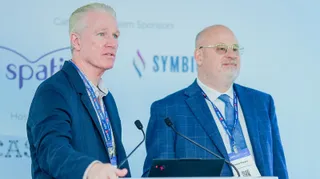How One Medical School Is Dealing With Too Much Information
Contact Our Team
For more information about how Halldale can add value to your marketing and promotional campaigns or to discuss event exhibitor and sponsorship opportunities, contact our team to find out more
The Americas -
holly.foster@halldale.com
Rest of World -
jeremy@halldale.com
Medical students have a problem with TMI (too much information). Way TMI. Same with nursing, dental and other health profession students. The TMI problem doesn't mean that students are sharing personal information about their bodily functions when they really shouldn't (although being immersed in healthcare can make you forget conversation boundaries). Rather, in this case, TMI is the massive and growing deluge of information that anyone studying healthcare has to squeeze into the cranium these days. Drinking from such a firehose can be even more difficult if the student lacks prior experience (in medicine and other health sciences, not prior experience drinking from a firehose). With medicine and healthcare changing more rapidly than before, education has to change accordingly...and Harvard Medical School (HMS) has just unveiled a program that aims to help with TMI.
This summer, HMS is debuting “ HMX Fundamentals,” an online course and certificate program for those interested in going to medical school or other health professional schools. The courses are meant to be highly interactive with animations and videos, including those with real doctors and real patients. Taking one course would cost you $800; two, $1,000; and all four, $1,800. But before you have your five-year-old kid enroll, keep in mind that there's an application process (including essays) for the opportunity to take courses in physiology, immunology, biochemistry and genetics. Finish the course and you get a certificate of completion. Finish the course well and you may get a certificate of achievement. Currently, neither certificate counts toward credit for a future degree. But in the future? Who knows?
HMS Associate Dean for Online Learning Michael J. Parker, who has led efforts to build the HMX program, explained that the courses are helpful for those who are "changing careers to help them see whether a health profession is right for them" as well as those who may otherwise have "imposter syndrome, meaning that they got into medical school but don't have the scientific grounding yet." The courses also may help replace some of the materials normally covered in the first two years of medical school so that time can be used for other things such as learning additional aspects of patient care, health policy and population health, and eating, sleeping and going to the bathroom.


